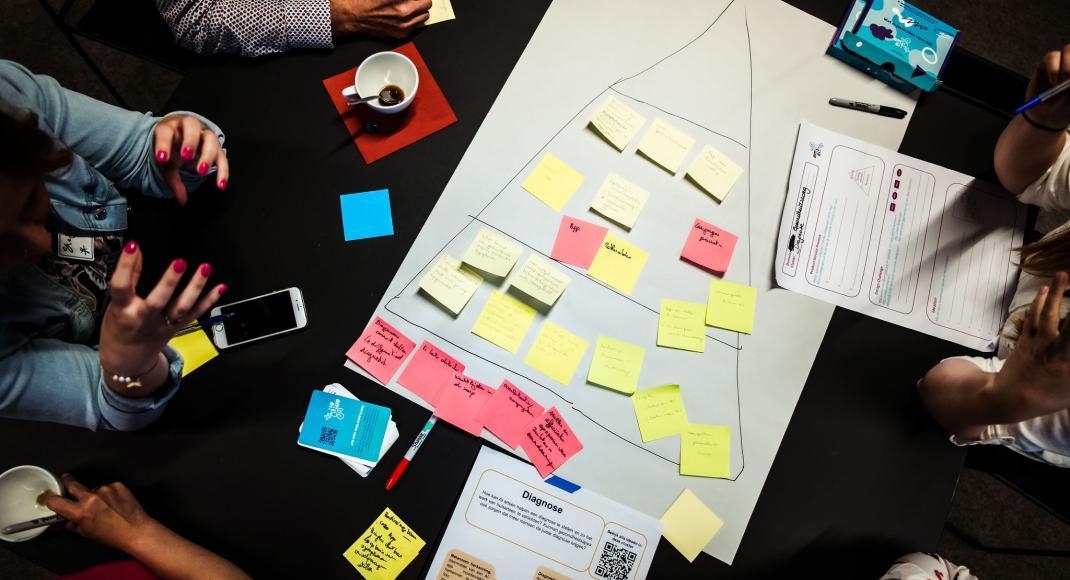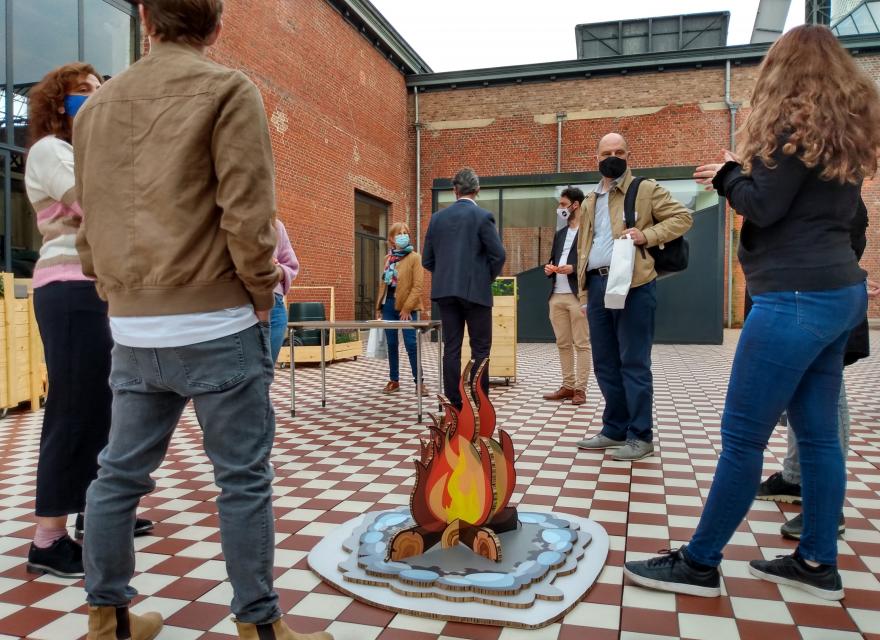Engaging citizens in AI innovation - the Amai! project
The Amai! project concluded its third year in December 2023. Now, five projects are selected to receive funding to develop their application from 2024 onwards. We'll let the two project coordinators, Karen Verstraelen and Neena Singh, explain what Amai! is all about.

What is amai! summed up briefly?
Neena Singh: Amai! is a collaboration between the Knowledge Centre for Data and Society and Scivil. It is funded by the Flemish government under the AI action plan. Amai! operates on two tracks. On one hand, we aim to inform Flemish citizens more about artificial intelligence; what can already be achieved with the technology, how it is already present in our daily lives, sometimes without us realizing it... On the other hand, we want to do more than just inform citizens about AI; we also want to involve them in innovation within the sector.
Karen Verstraelen: We annually launch a call for projects that address societal challenges using AI. Citizens are heavily involved in this process. Initially, they provide problems where AI can offer solutions. Consortia wishing to submit a project proposal must build upon these ideas or issues. Furthermore, citizens have the decisive vote in determining which projects ultimately receive funding. This occurs through a citizen jury and an online vote.
Neena Singh: These two aspects are closely intertwined in Amai! Citizens are not only informed about artificial intelligence, but they also determine the direction of the innovation that Amai! funds. Conversely, the currently nine (as of 2024 fourteen!) Amai! projects are wonderful examples to use in our narrative about artificial intelligence serving society.
Citizens are not only informed about artificial intelligence, but they also shape the direction of the innovation that Amai! finances.
Why does the Amai! project focus so strongly on AI?
Karen Verstraelen: Within the Flemish AI Policy Plan, resources are allocated to AI innovation and research. The Flemish government also aimed to focus on outreach and awareness-raising among the Flemish population about artificial intelligence. This is where Amai! originated and received its funding. With Amai!, we aim to democratize artificial intelligence. AI is increasingly becoming a part of society and is much more present in our daily lives than we sometimes realize. Therefore, knowledge about the possibilities and pitfalls of this technology needs to be more widely disseminated.
Neena Singh: There is already a wide range of excellent materials available for learning about AI. Where we aim to make a difference with Amai! is in how we engage citizens. We don't want to start from the technology itself, but rather from societal challenges for which artificial intelligence can provide solutions. When we engage people about Amai!, our first question is not 'What do you already know about AI?', but rather 'What problem are you facing? What challenge do you want to address?'.
Amai! integrates a citizen science approach as well. How does that happen?
Karen Verstraelen: You could say that it starts with crowdsourcing ideas and challenges to address with AI. Over the past three years, we have gathered nearly 1000 of these ideas from Flemish citizens. These ideas form the starting point of the project call. The submitted project proposals must respond to one or more of the ideas in this collection. Just before the project call, we also organize co-creation sessions where AI experts, companies, governments, civil society organizations, and citizens come together to brainstorm solutions for the Amai! challenges. The final steps in the project call are the public vote and the citizen jury. This way, citizens ultimately determine which of the candidate projects will be funded.
Neena Singh: The Amai! projects themselves also engage in citizen science. When submitting a project proposal for funding, you must include a citizen science approach in it. In the proposal, you need to clarify the ways in which you will involve citizen scientists in the research or development of your application.
Karen Verstraelen: By the way, with Scivil, we're always ready to advise potential project submitters on how to integrate citizen science into their project proposal.
Can you tell us a bit more about the project call?
Neena Singh: The project call typically runs over the summer, usually from May to September, and is open to industry, governments, civil society organizations, citizen associations, and research institutions. Project applicants form a consortium with at least two partners from different sectors. For example, a company can submit a proposal together with a government entity, or a citizen association can partner with a university. However, a consortium consisting solely of a university and a college is not considered valid for the Amai! call, as they both fall under the category of 'research institution'. Additionally, the project proposal must primarily align with one of the 1000 ideas on the Amai! platform.
Karen Verstraelen: As an example, last year, the Waste Watchers project was funded by Amai!. It is a collaboration between VITO, a research institution, and River Cleanup, a non-profit organization. They are developing a system that uses drones for automatic litter detection along riverbanks. This initiative responds to various citizen ideas on the Amai! platform.
Neena Singh: The co-creation sessions often serve as an initial step in shaping a project. Participation in these sessions is not mandatory to submit a proposal, but it can be highly valuable. During the co-creation sessions, citizen ideas often become more concrete, and we have seen several project consortia emerge from them. The pre-registration is the first mandatory step in the process. During this stage, you submit a brief summary of your project idea. The final project proposal is only due in September.
Karen Verstraelen: Throughout the process, the Amai! team organizes information sessions, but you can also reach out to us individually. Via email or in a conversation, we address all your questions about the procedure, citizen science, or human-centric AI. The final selection of projects occurs in two steps. First, an expert jury scores the project proposals. The highest-scoring projects proceed to the next round. Then, a citizen jury selects several projects. The remaining projects to be funded are chosen by the general public through an online vote. From October 14th onwards, you could vote for your favorite project of 2023.
With Amai!, we aim to democratize artificial intelligence. AI is increasingly becoming a part of society and is much more present in our daily lives than we sometimes realize. Therefore, knowledge about the possibilities and pitfalls of this technology needs to be more widely disseminated.
To wrap up, one final question: what did you find particularly remarkable or inspiring about your work for Amai! recently?
Karen Verstraelen: On the international stage, Amai! is highly appreciated. We regularly have the opportunity to present Amai! at international conferences, where we consistently receive positive feedback. Therefore, we released a toolkit that outlines our methods and activities. We hope that it can serve as inspiration for other participatory projects, within or outside the field of artificial intelligence.
Neena Singh: The demand for information is immense! We can barely keep up with the demand for lectures and workshops on AI. The public availability of generative AI applications such as ChatGPT, DALL-E, or MidJourney has certainly contributed to this increased demand. It's reassuring to know that what we do is making a difference.
Karen Verstraelen: We've seen a significant shift in awareness surrounding AI over the past three years. Initially perceived by many as a distant concept or pure science fiction, there's now a much stronger recognition that AI plays a significant role in our lives. For instance, many teachers have recently expressed concerns about the use of ChatGPT in the classroom and among their students. In response to this specific concern, we've developed a lesson package and training program for teachers (in Dutch).
